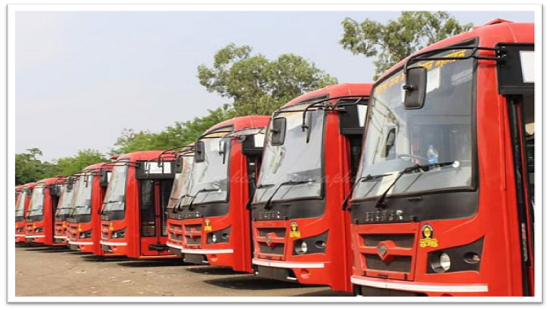
Maharashtra Government Announces ₹6,000 Diwali Bonus and ₹12,500 Advance for MSRTC Employees — A Festive Boost to Workforce Morale
In a move that reinforces Maharashtra’s commitment to employee welfare and financial discipline, the state government has announced a Diwali bonus of ₹6,000 and a festival advance of ₹12,500 for employees of the Maharashtra State Road Transport Corporation (MSRTC). The announcement, made at the Sahyadri Guest House in Mumbai, symbolizes a blend of empathy and pragmatic governance — ensuring that those who drive the state’s transport network share in the joy of the festive season.
The meeting, chaired by Deputy Chief Minister Eknath Shinde, included Transport Minister and MSRTC Chairman Pratap Sarnaik, Vice-Chairman and Managing Director Dr. Madhav Kusekar, and representatives from various employee unions and action committees. Together, they discussed a comprehensive approach to strengthen the financial health of the corporation while supporting nearly 85,000 MSRTC employees and officers across the state.
Reviving a Public Sector Pillar
The MSRTC — one of India’s largest and most crucial public transport undertakings — connects remote villages with urban centers, serving millions of passengers daily. Over the past few years, the corporation has grappled with financial pressures and operational challenges. The Diwali announcement, therefore, goes beyond a festive gesture; it represents a strategic morale boost aimed at sustaining the organization’s human capital and service delivery.
To complement the immediate relief, the state government has also approved ₹65 crore per month to clear pending salary arrears arising from pay hikes between 2020 and 2024. This structured financial support ensures that employees not only receive their long-overdue dues but also regain confidence in the system’s long-term stability.
A Diwali Gift Rooted in Gratitude
Deputy CM Eknath Shinde highlighted that the initiative is grounded in appreciation for the dedication and resilience of MSRTC employees. “It is essential that MSRTC employees also enjoy a joyful Diwali. Hence, the government has taken this decision,” he stated. His words echoed a broader sentiment — that public service deserves recognition, particularly from those who work tirelessly to keep Maharashtra’s transport network functional, even in times of crisis.
The timing of the announcement is particularly significant. With excessive rainfall affecting several parts of Maharashtra, the government has been simultaneously addressing agricultural distress and infrastructural challenges. Yet, by ensuring a financial cushion for its transport workforce, the state reinforces a governance philosophy that balances economic prudence with social responsibility.
Strengthening MSRTC’s Financial Future
The Shinde government’s focus, however, is not limited to short-term relief. A critical component of the discussion was the need to make MSRTC financially self-sustaining. Officials revealed that the state is exploring Public-Private Partnership (PPP) models to develop MSRTC-owned land, thereby unlocking the latent value of idle assets.
This strategy aligns with Maharashtra’s larger vision of modernizing state-owned enterprises through innovative, market-driven solutions. By creating additional revenue streams, MSRTC can diversify its income, reduce reliance on subsidies, and reinvest in upgrading its fleet, digital ticketing systems, and passenger amenities.
Experts view this dual approach — employee welfare coupled with asset monetization — as a balanced model for public enterprise reform. It demonstrates that welfare policies need not contradict fiscal efficiency when designed with foresight and inclusivity.
A Constructive Lens on Governance
Rather than viewing the announcement purely as an expense, analysts interpret it as an investment in workforce morale and productivity. Festivals like Diwali hold immense cultural and emotional significance in India, and financial incentives during this period act as psychological and economic multipliers. For many employees, especially those stationed in rural or semi-urban depots, the bonus and advance will help meet essential family and festive needs, circulating money back into local markets.
Furthermore, the government’s decision sends a reassuring message amid the wider challenges faced by the public sector workforce. By acknowledging service and loyalty, the leadership reinforces a trust-based relationship between policymakers and employees — an essential foundation for institutional reform.
Toward a Sustainable Transport Ecosystem
The implications of this announcement extend beyond MSRTC. It reflects a renewed emphasis on human-centric governance in Maharashtra’s policy framework. Over the past few years, the state has actively sought to modernize infrastructure, expand affordable housing, and create sustainable livelihoods. Within this broader reform narrative, supporting state transport employees — who form a critical link in rural connectivity and public service — strengthens both the economy and social fabric.
MSRTC’s revival is also vital from an employment perspective. With nearly 85,000 direct employees and thousands of dependent families, the corporation’s well-being has a direct impact on the livelihoods of over three lakh people across Maharashtra. The Diwali incentive, therefore, represents not just a financial allocation but a reaffirmation of the government’s commitment to inclusive growth.
Deputy CM Shinde’s administration continues to balance competing priorities — from rural development and agriculture to urban infrastructure and public sector reform. By infusing fresh energy into MSRTC’s workforce, the government sets a precedent for compassionate yet accountable governance.
As Maharashtra prepares for Diwali, this announcement resonates as more than a financial package; it is a celebration of resilience, recognition, and renewal. In a time when many public sector enterprises across India face uncertainty, Maharashtra’s approach stands out for its clarity of vision — rewarding those who keep the state connected while laying the groundwork for future stability.
By aligning immediate welfare measures with long-term fiscal reforms, the state demonstrates that empathy and efficiency can coexist — lighting a path forward where governance listens, acts, and leads with purpose.





